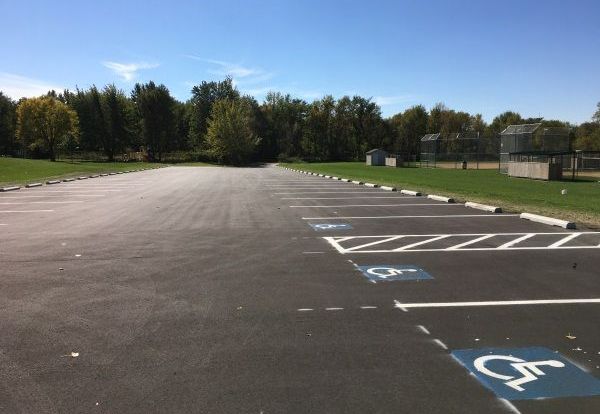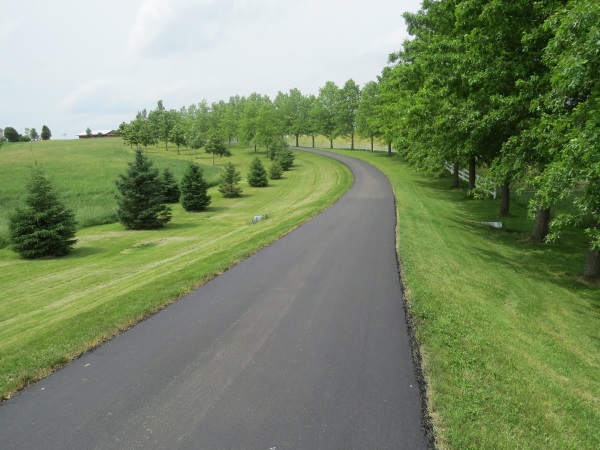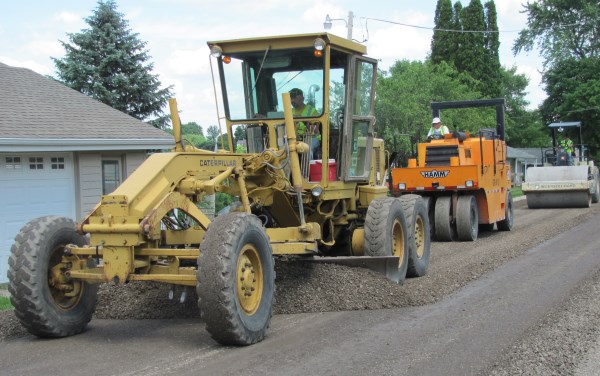As asphalt providers and industry leaders, our goal is to be a resource for community members by providing knowledge and expertise on everything from asphalt design and maintenance to what to look for when hiring a contractor. If you do not find the information you are looking for below, feel free to contact us or schedule a Lunch & Learn!
Benefits of Asphalt
Asphalt is a sound investment for a variety of reasons. From increased fuel economy and environmental friendliness to fast construction and maintenance, asphalt is the best choice for smooth, safe roads.

6 Tips for Property managers: pavement & parking lot maintenance
If you are a business or property owner, you know how important it is to keep your property well-maintained. Your pavement and parking lot are no exception. Follow these six tips for pavement and parking lot maintenance!
What to consider when hiring a contractor
Your project is an investment you don’t want to hand over to just anyone. Put your project in capable hands by considering these factors when choosing a contractor:
- Experience: One way to find out if a contractor can successfully complete your project is to ask about their experience
- Bonds and Insurance: As the customer, it is important for you to be protected in the event of a project complication. Make sure your contractor has a surety bond and insurance
- Equipment: Although you may not understand the equipment needed to complete your project, it’s still an important topic to discuss with a contractor
- Member Associations: When contractors are members of state and local associations, it shows they are committed to their industry

-
Reputation: Do your research on contractors before hiring them. Ask for references and check them thoroughly
Wondering what types of questions you should ask potential contractors? View our full list of tips here.

Homeowners: Chip Seal Tips
Our goal is to make sure homeowners know what to expect when their roads are being chip sealed. From moving objects away from the curb to staying cautious around equipment, your safety and satisfaction are our main priority. Keep these important tips in mind during the chip seal process.
Lunch & Learn
Learn more about the design and construction of asphalt pavements, and get a firsthand look at local case studies by signing up for a Lunch & Learn with LL Pelling!
Our presentations are tailored to meet your needs and are beneficial for engineers and consultants looking to expand their asphalt knowledge. Lunch & Learns are not limited to lunch – we’ll happily cater breakfast or snacks depending on what is convenient for your team.
FAQ
Asphalt faq's
How are asphalt and concrete different?
The answer to that can be quite lengthy and technical. in short, asphalt is made by mixing aggregates (rocks) with a bitumen binder (stick, black oil substance). Concrete is made by mixing aggregate with a cement binder and letting it cure. Asphalt is considered a flexible pavement while concrete is rigid. Both pavements' life cycle, initial cost and maintenance costs vary by mix type. It's important to consider both pavements and do research to ensure you're getting the best pavement for your traffic needs.
How can asphalt be 100% recyclable?
It’s simple. An asphalt pavement can either be recycled or re-used. Here’s the distinction: recycling means adding the old (reclaimed) asphalt to new asphalt mixes. The aggregates and asphalt cement perform the same function in the new mix as they did in their original application. This method reduces the amount of virgin resources (bitumen and aggregate) needed to make a new asphalt road. To re-use the asphalt pavement means it’s ground up and used as foundation, fill, or base course material, with the recovered aggregate and bitumen performing a lesser function than in the original application. (Reference: EAPA.org, Industry Statement on the recycling of asphalt mixes and use of waste of asphalt pavements)
What is asphalt?
You probably mean “asphalt pavement." There are two basic ingredients in an asphalt pavement: aggregate (crushed stone, gravel, and sand) and asphalt cement. About 95 percent of the total weight of an asphalt pavement consists of aggregates and the remaining 5 percent is asphalt cement. Asphalt cement is the black liquid that acts as the glue to hold the pavement together. Some mixes also require small amounts of additives, which can improve mix performance or strengthen the specialty mix.
Seal Coat FAQ's
Do you sell tack oil/asphalt/concrete?
We sell MC-300, MC-30, MC-70, and CSS1H Emulsion at the North Liberty Oil Plant (behind our shop) by the gallon. Please make sure to bring your own container; we do not provide them. We also sell hot-mix asphalt at all three of our plants. We do not sell ready-mix concrete.
Do you sealcoat parking lots?
First, let’s make sure we’re on the same page. A sealcoat is a water-carried petroleum surface treatment that is sprayed onto the pavement. The application rejuvenates your pavement and makes it very dark, nearly black in appearance. We do not sealcoat parking lots or any surface as we see it as a cosmetic treatment. Please note that sealcoating and chip seal coating are two very different services. See above for a description on our chip seal coating services.
Why should our town consider seal coating instead of asphalt or concrete?
Chip seal is the most cost-effective pavement and best value for your maintenance dollar. It’s a low-cost alternative to asphalt and concrete pavements. If you’re on a limited budget, chip sealing your pavement is the best option. In the future, chip sealed roads can be used as the first stage in preparing for an asphalt overlay.
What happens when you sealcoat our road?
We offer 3 options for seal coating your pavement: option A, B, or the combination of both called a Double seal coat. To generalize, both option A and B consist of spraying liquid asphalt (black sticky substance) on the pavement and then covering it with aggregate (rock). The surface is then rolled out to push the aggregate into the asphalt. For a more detailed answer check out our Chip Seal brochure.
line striping faq's
How can I ensure that my property meets ADA standards?
Americans with Disabilities Act standards are handled by each city and are reviewed during the building permit process. Owners and franchisers should contact their city to inquire about a property’s ADA compliance. To obtain free copies of the ADA Standards and other helpful publications issued by the Justice Department call the ADA Information Line at (800) 514-0301 (voice) or (800) 514-0383 (TTY).
How long does it take to restripe a parking lot?
Again, it depends on the size of the lot and the schedule/timeframe we’re given to work on your property. For example, most restaurant locations won’t permit us to close off sections of the parking lot during operating hours, so all striping is done after hours. McDonald’s only allows us to line stripe after 11pm. Smaller commercial lots may only take a few hours, max. We have many clients who allow us to restripe in phases, only closing small sections at a time. This is very helpful for businesses that are open 24/7.
How much does it cost to restripe a parking lot?
We hate to generalize, but it really does depend on the size of the parking lot, how many stalls and type of lines that need painted, and what type of paint you choose. For a list of all the options, from type of paint to types of line striping offered (single, double, tandem, etc.) click here.
shingle recycling faq's
How can I find a roofing contractor that’ll recycle my roof?
You can find a small, non-exclusive, list of contractors who recycle with us here. This is not an all-inclusive list. We suggest that while shopping around for a roofing contractor you ask in advance if they recycle shingles. If you’ve already decided on a contractor, who doesn’t currently recycle, direct them to contact us (or our website) for information on how to start! In addition to the environmental impact recycling has, there’s the added incentive that, per ton, it’s cheaper to recycle shingles than to dump them at the landfill!
Why should I care if my roofing shingles are recycled or put in a landfill?
- Reduces Landfill Waste: Shingles take 400 years to break down in a landfill and more than 11 million tons are sent to landfills each year.
- Minimizes the Need for Foreign Oil: Recycling one household roof is equal to approx. 2 barrels of oil.
- Job Creation: Choosing to recycle your shingles helps spur economic growth in the recycling industry thus contributing to job creating efforts
- Taxpayer Savings: Recycled asphalt shingles (RAS) can be used to create new roads and repair old ones at a reduced cost. This means it costs less to build and maintain public roads.
Where do I take old shingles to be recycled?
We accept residential asphalt shingles at the Iowa City landfill. Click here for hours of operation and fees.